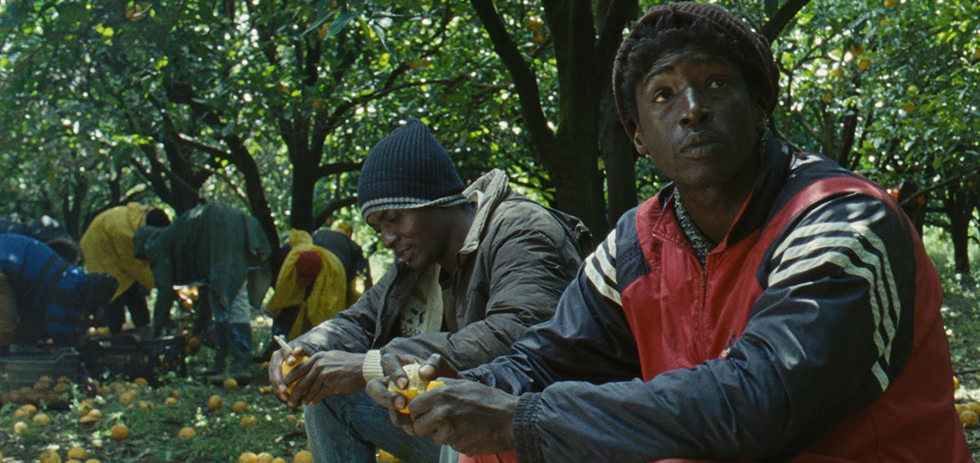While there are plenty of affecting and rightly confronting films about refugees in the 21st century, and even some about the concept of the refugee in the immediate future,1 there has been a certain absence in the cinematic discourse focusing on the journey itself – with Moussa Touré’s The Pirogue from a few years back is a memorable exception. In Mediterranea, however, Jonas Carpignano pieces together one of the most layered and nuanced portrayals of an experience that is deeply underrepresented in film in the 21st century. The film is a piece of consuming realism coated in a palpable humanist approach to portraying pain, anxiety, and disappointment on screen.
Initially, Carpignano’s work came to fruition in the short film sketch of A Chiana, which expressed a few of the thematic ideas of exploring migration. As a work, Mediterranea is more personal, reflecting and castigating the directors own country’s response to and treatment of refugees in the 2010 Rosarno race riots. It’s a film built upon intricate pacing and a process of tension and release. Starting in Burkina Faso, we follow two men – Ayiva and Abas – as they attempt to make it to Europe. Carpignano carefully establishes the film as one about the journey, as we’re taken through deserts, across oceans, through Libya and North Africa, before eventually arriving in Italy. From this point onwards, Mediterranea shifts away from this fast-paced adventure, in a move from the director to push the audience towards the realisation that, even as frightening as the expedition to Italy is, the process of ‘fitting in’ is equally difficult.
The stories we see are unique, and clearly the result of the extensive period of research that took place in making such a film. That said, they don’t carry Mediterranea on their own, and are grounded by the awe-inspiring cinematography throughout. Wyatt Garfield’s shot composition appeals to the surreality of the earlier scenes, capturing the essence of the slow and strained nights that play out on screen. The profile shots of Ayiva and Abas that punctuate the film – as well as the wider shots in the scenes of protest and chaos on the streets of Italy later in the film – are complex, and constructed in ways that effectively capture the intentional absence of stability in mood, plot, and expectation in the lives of both protagonists.
The soundtrack reflects the precision of the rest of this remarkably coherent work. Carpignano’s music choice is focused on artists of the African diaspora, with songs used repeatedly as motifs that form many of the emotional climaxes of the film. Specifically, Rihanna’s “We Found Love” is re-contextualised by Mediterranea as a song about detachment, disassociation, and disorientation for Ayiva – as he is confronted with the realities of immigration in the face of racist attacks, and the growing heartache caused by his separation from his wife and daughter. By the final time the song is used, the effect is shattering and the emotional scope of the film is fully realised as deeply expansive and affecting.
There are moments throughout Mediterranea that lend themselves to cliche, with a lot of the film relying on a fairly standard structure to tell its story. Despite this, it still succeeds in all of its intentions as a film, telling of a markedly unique plight and a highly personal tale of two refugees; with constant attention to their emotional complexities and their limits. It’s also a deeply sincere work, and the audience response it provokes owes a lot to this predilection. There are few films that navigate the refugee experience in recent years that operate with the same attention to detail, diversity of experience, and the abject pain and fear that defines such a journey as Mediterranea. It’s a film that garners empathy, both in a humanising and confronting manner, with the careful meditation between the two resulting in a deeply worthwhile piece.

